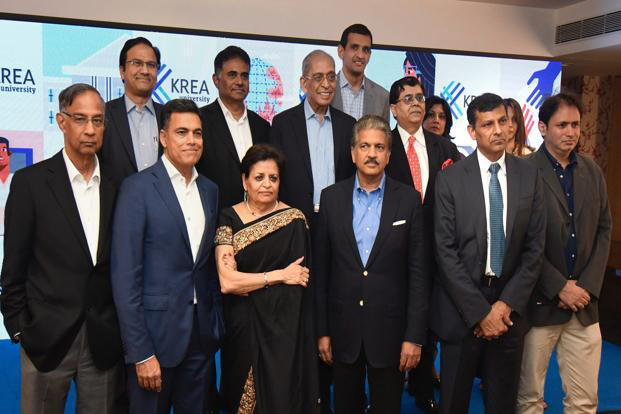Registered with the Registrar of Newspapers for India under R.N.I 53640/91
Vol. XXVIII No. 2, May 1-15, 2018
A university for Thinking Indians
S. Viswanathan

A star-studded Krea team (front row: left to right) R. Seshasayee, Sajjan Jindal, Vishaka Desai, Anand Mahindra and Raghuram Rajan during the announcement of Krea University
Krea University to be set up at Sri City, promises to be different. The private university will offer four-year residential undergraduate programmes in liberal arts and sciences.
Thought leaders – Raghuram Rajan, N. Vaghul, R. Seshasayee and Sunder Ramaswamy, have been working on this unique project. Their passion and stature have helped bring together several business leaders, including Anand Mahindra, Sajjan Jindal, Kiran Mazumdar Shaw, Anu Aga and young Kapil Viswanathan to set up this unique university. The academic council has academicians from the prestigious Princeton, Stanford and Columbia universities. The broad base includes a musician, a journalist, and social workers.
For decades, higher education remained in the domain of the state. Though India has had a tradition of private philanthropy that liberally supported education and health, over time, these also suffered from severe restrictions.
Tamil Nadu, under M.G. Ramachandran, opened up higher education for private participation. Unfortunately, the massive demand for engineering and medical education allowed politicians and influence peddlers to grab the opportunity. High capitation fees, corruption, and black money ruled the roost; the field became fertile ground for politicians and all and sundry businessmen to enter. Many of these became flourishing family businesses with sons, daughters, in-laws, and outlaws becoming chancellors and vice-chancellors.
Emienent educationist Dr. M. Anandakrishnan frequently pointed to the corruption and commercialisation in the selection of vice-chancellors through auctions. The “the short three-year term for vice-chancellors and the huge bribes involved in the selection process, denied high calibre academicians getting selected,” he used to lament.
There were a few private initiatives from industry captains. Decades back, industry leaders like A. Sivasailam and A.M.M. Arunachalam, got together to set up a management education institute. But it made little progress.
The Chennai Mathematical Institute that imparts education in mathematical science is among the rare exceptions. When CMI was under financial constraints, Shriram Group’s R. Thyagarajan stepped in and under the lead of Dr. C.S. Seshadri, built it to international standards.
After liberalisation of the economy in 1991, Rajat Gupta of McKinsay succeeded in getting the participation of top business schools – Wharton, Columbia, and the London Business School – to set up a global B-school in India. Chandrababu Naidu seized the opportunity with alacrity and the Indian School of Business was set up. It proved a runaway success.
Krea promises to be another big success. With a renowened economist, banker and chartered accountant on the lead, understandably, the focus is not on engineering: Seshasayee, a connoisseur of music and literature, has been stressing a nice blend of liberal arts, science and technology. The association of the prestigious Ivy League institutions should help offer a full option of subjects to choose and excel. The curriculum will have three distinct features that are different from the existing learning patterns: problem-solving capabilities; acquiring skills for design; and ethics with social concerns. Significantly, Krea had opted for a four-year undergraduate course with honours on the US pattern which should facilitate pursuing higher studies elsewhere.
Raghuram Rajan says that Krea would attempt to create a new generation of thinking Indians who will contribute to the development of the globe. Seshasayee adds that the inter-woven learning approach would give creativity and action in arts and sciences, theory and practice, Eastern and Western perspectives and learning of the past with readiness for the future.
To be set up at an initial cost of Rs. 750 crore, the university will function from the 300,000 sq.ft IFMR campus in Sri City. Admissions will open in November this year. Over the next couple of years, it will move to a 200-acre campus nearby. The annual fee is around Rs. 7-8 lakh – (Courtesy: Industrial Economist).

